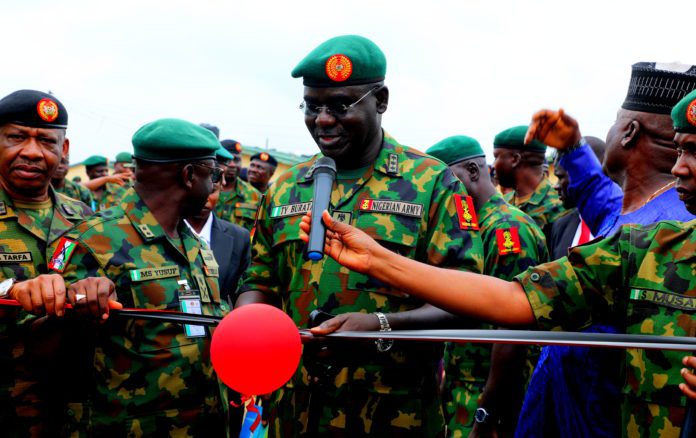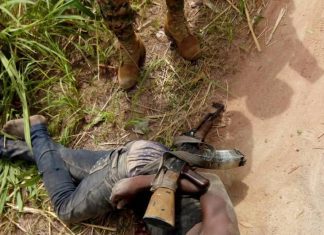By Yakubu MohammedS
”Soldiers would marry the prettiest women, live in the best homes, eat the best food, wear the best cloth and drive the best cars because when war comes, they die first” —Muhamadu Ribadu
I stumbled on this quote of Nigeria’s first Defence Minister after independence and a reputable Northern politician of his time, Alhaji Muhammadu Ribadu. He lived an eventful life between 1909 and 1965.
He was not a soldier, but knew exactly the pains of a soldier. So, I was fascinated at this catchy wisdom. In Ribadu’s time, Nigeria knew no war, but peace. However, it was clear to his mind that peace could only, but be ephemeral, as there would come a time to war, when only soldiers are the dutiful rescuers.
It has struck me strongly that Ribadu must have been gifted with a stunning clairvoyance. He correctly envisaged that an Army in Nigeria would one day face war. He had the power of prediction; he had prophetic wisdom. Ribadu never lived to see the fulfilment of his prophesy, as he answered the divine call on May 1st, 1965, the eve of the 1966 coup, which disrupted the politics of the first republic and the eventual three-year Nigerian civil war.
Like Ribadu predicted, scores of soldiers laid down their lives to break the cord of secessionists in Nigeria. These soldiers died so that we could live and for the nation to thrive in unity, peace and progress. The need to give soldiers absolute comfort in peace times was the strong message conveyed by the ditty of the cerebral Ribadu.
He was lucid that a soldier must be entitled to all the niceties and luxuries of life, hence in times of war, the soldier is the first to sacrifice his life for others to live.
Is there any justification for anyone to claim, a soldier does not value his life or entitled to the epicurean lifestyles of the rest of us? There is absolutely no reason.
So, as the then serving Minister of Defence, Ribadu ensured rapid expansion of the Nigerian Army and other arms of the military. In tandem with his mindset of welfare for the soldier, Ribadu established the Defence Industries Corporation and many other such initiatives designed for the comfort of soldiers.
It is the same philosophy, the current Chief of Army Staff (COAS) and ombudsman of the counter-insurgency war, Gen. Tukur Yusufu Buratai has imbibed in his leadership of the Nigerian Army. The Army Chief believes soldiers have signed a pact to die for us. They keep vigil for us to sleep in peace; they accept the bullets of the enemy for us to have life. The Army is a call only for the strong-hearted and soldiers deserve maximum comfort.
Naval war veteran and former US President, John F. Kennedy, fondly exhumes this pride in military service when he said; “Any man who may be asked in this century what he did to make his life worthwhile, I think can respond with a good deal of pride and satisfaction: ‘I served in the United States Navy.”
Gen. Buratai is a combatant soldier who is fired by the innate passion of service to humanity. He is an epitome of an ideal soldier anywhere in the world. My perception of him is that of an officer who embodies selflessness, patriotism, excellence and loyalty in leadership. Like Ribadu, he prioritizes the welfare of soldiers. Sun Tzu admonished military commanders to give every comfort to their soldiers and they can follow “you to the deepest valley.” Gen. Buratai is today fondly referred to as Sun Tzu of Africa by his patriots and mentees within the military for religiously upholding soldiers’ welfare and comfort like a commandment.
Gen. Buratai’s adoption of this philosophy is responsible for the Army’s winning streaks in the anti-insurgency battles. What has propelled our Army officers and soldiers to fight unflinchingly and win the war on terrorism is rooted in the policy of Gen. Buratai’s fixation on the absolute comfort and niceties his administration is building for soldiers nationwide.
Famously, the Army Chief instituted the culture of prompt and timely payment of salaries and allowances of soldiers. He considers it an inviolable and sacrosanct obligation especially for soldiers in the frontlines. The era of soldiers grumbling for non-payment of legitimate entitlements is long gone with Gen. Buratai on board.
Furthermore, Gen. Buratai knows a soldier deserves a decent and habitable shelter for himself and family. In 2016, barely months after he assumed office, Gen. Buratai’s heart was drenched in sorrow as bemoaned the years of neglect of accommodation for the Army thus; “The soldiers are staying in a very bad accommodation, it is unfortunate!” Therefore, his administration embarked on massive renovation of Army Barracks and offices to provide both residential and office accommodation for soldiers.
Such imprints of Barracks renovations or constructions signposted very early in his administration as noticeable in Maxwell Khobe Cantonment, Jos; Obienu Barracks in Bauchi and Nigerian Army Barracks in Bama among others. Gen. Buratai has also made provision of portable water in Army Barracks a fundamental objective, where it is also extended to host communities.
A few examples like the Army Division in Enugu and its host community, Abakpa feels this impact; the Rukuba and Miango communities are also serviced by the Multi-Purpose Dam at Maxwell Khobe Cantonment, Jos. And it is replicated fairly in all Army Barracks across the nation.
The Army Chief has also initiated the building of new schools and refurbishment of old ones. He aggressively embarked on renovation and construction of new Army schools across Nigeria for children of Army officers and soldiers, starting from Abuja to elsewhere in the federation.
Access roads in Army Barracks are also rehabilitated, much like Army hospitals. Under Buratai’s leadership, soldiers enjoy a large dosage of comfort. He is aware that happy troops are the backbone to the success of any military expedition.
Its apparent that Gen. Buratai’s passion for the Army and service to his fatherland is innate. It can be gleaned from the background that in his time as a teenager, many of his peers naturally dreaded the Army. The military was perceived as a fearsome and hazardous vocation. Existing and working to die for others to live is a hard decision to adopt. But the young Buratai opted for it.
Himself the son of the World War II veteran, Mallam Yusuf Buratai who served under the Royal West African Frontier Force (RWAFF) from Nigeria, Gen. Buratai is a descendant of the lineage of chauvinists. So, he dreads no war and aims to conquer enemies of the state at all times.
Shortly before his demise two years back at the age of 106, the elder Buratai revealed that he never prodded his son to enlist in the Army, and that Gen. Buratai voluntarily opted for a military career. Pa Buratai said,“I did not ask him to join the army. He joined willingly. When he finished school here in Maiduguri, there was an advertisement urging young men to join the Nigerian Defence Academy (NDA). He applied and was successful, so he voluntarily joined the army.”
Mallam Buratai believed that mankind must be freed from the excesses of demonically possessed souls and the only way to contribute his quota in enthroning global peace was the romance with the boots. He had a conviction that a soldier lives and dies for his country. He was infinitely sad with tales of soldiers these days, retreating from the battlefield in the face of enemy forces. That was his notion of the Army.
Therefore, Gen. Buratai has stood on these principles and perception of his father throughout his military career. It accounts for his superfluous performance as a soldier, crack combatant and leader for what his admirers have described as a rewarding military career to his nation.
As a leader of the Nigerian Army, Gen. Buratai finds the wisdom of Gen. Colin Powell worthwhile. Powell proclaimed that “The most important thing I learned is that soldiers watch what their leaders do. You can give them classes and lecture them forever, but it is your personal example they will follow.”
Thus, under Gen. Buratai’s leadership, the Nigerian Army has been on a steady progressive match in excellence and performance in all ramifications because he is an ardent exemplar in official duties. Nigerians have seen a reformed and re-professionalized Army, which is loyal and patriotic. Soldiers are recording remarkable and uninterruptedsuccesses in the battles against Boko Haram and bile insurrections in the country.
Soldiers under Gen. Buratai’s guidance have stamped their dominion in all special assignments in Nigeria. Soldiers engaged on Internal Security (IS) observe the highest professional standards, maintain maximum respect for human rights of Nigerians as well as humbly sticking to the Rules of Engagement (ROE).
The Nigerian Army under Gen. Burataiis not only excelling in war, but expanding its base. From five Divisions of the NigerianArmy, which Gen. Buratai inherited in 2015, he has increased it to eight Army Divisions for ease of military operations. There are thousand Army Forward Bases stationed in crisis prone areas. Gen. Buratai has been able to establish an Army Aviation School and the Nigerian Army University, the first Army varsity in Africa within theshort time of his leadership.
In Gen. Buratai’s prosecution of the counter-terrorism war in Nigeria, he is resolute and resilient. Like the British Field Marshal Sir Herold Alexander said, Gen. Buratai knows, “The knowledge of not only the enemy’s strength and disposition, but also how, when and where he intends to carry out his operations; brought a new dimension to the prosecution of the war”
When Gen. Burtai hops into the trenches against insurgents, in the words of the British Air Marshall ‘Bomber’ Harris, he steps out vengefully because “They sowed the seed, and now they are going to reap the whirlwind.”
In all the military engagements by Gen. Buratai and soldiers, they are exposed to grave dangers for no fault linked to them. Some have even paid the supreme price fighting to enthrone peace in a conflict they are oblivious of its causes. But they have remained loyal and patriotic to the entrenchment of peace. It now struck the wisdom of Ribadu in me, justifying why a soldier needs the best in peace times.
No doubt, Gen. Buratai has been inspired and guided by the advice his father offered him the first day he enlisted into the Army. Pa Buratai counselled the young officer Buratai to , “… be loyal to his superiors and constituted authority. I warned him to avoid any form of vice and I am grateful to God, he obeyed what I told him.”
It is the religious observance of this self-discipline or ethical code that has guided Gen. Buratai’s service elevation in the Army. This philosophy has always compelled Gen. Buratai to go the proverbial mile to seek comfort for soldiers. It explains why his leadership and administration of his office as COAS and leader of the counter-insurgency operations in Nigeria is a success story.
Mohammed, a public affairs commentator wrote this piece from Minna, Niger State.
Join Television Nigerian Whatsapp Now
Join Television Nigerian Facebook Now
Join Television Nigerian Twitter Now
Join Television Nigerian YouTUbe Now





